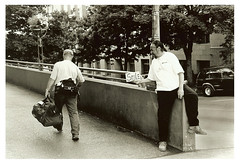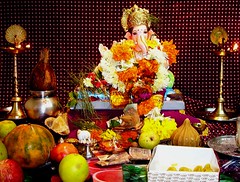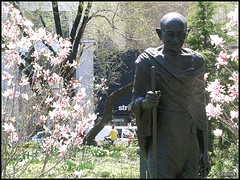God grant you the light in Christmas, which is faith; the warmth of Christmas, which is love; the radiance of Christmas, which is purity; the righteousness of Christmas, which is justice; the belief in Christmas, which is truth; the all of Christmas, which is Christ.
-- Wilda English
Merry Christmas
In the Passage from the Cradle to the Grave

Life at length is frail
I seek again the river's source
through time's dark shadowed veil.
In the fast fading century
we spin through the years
I pray that our failing vision
clears -- our vision clears.
And in the passage
From the cradle to the grave
We are born, madly dancing
Rushing headlong through the
crashing of the days
We run on and on
Without a backwards glance
We run on and on
Without a backwards glance.
"In the Passage"
--Dan Fogelberg
Dan died this morning, December 16th, 2007, after battling prostate cancer for several years. Thank you for the many years of music, poetry and inspiration. You'll be missed.
Destination Unknown
One's destination is never a place but rather a new way of looking at things.
-- Henry Miller (1891 - 1980)
Curiosity, Wonder, Spontaneous Delight
Once we believe in ourselves, we can risk curiosity, wonder, spontaneous delight, or any experience that reveals the human spirit.
-- e e cummings
The Impact of Attitude
The longer I live, the more I realize the impact of attitude on life. Attitude, to me, is more important than facts. It is more important than the past, than education, than money, than circumstances, than failures, than successes, than what other people think or say or do. It is more important than appearance, giftedness or skill.
The remarkable thing is we have a choice every day regarding the attitude we will embrace for that day.
We cannot change the fact that people will act in a certain way. We cannot change the inevitable. The only thing we can do is play on the one string we have, and that is our attitude.
I am convinced that life is 10 percent what happens to me and 90 percent how I react to it.
-- Charles Swindoll
Global Cooling
The culture we live in will often sabotage us. That is because we are in the midst of a "global cooling." Human relations are becoming colder. Communications are becoming more hurried and impersonal. Values such as profit and efficiency are taking on greater importance at the expense of human warmth and genuine presence.
-- Piero Ferrucci, The Power of Kindness
For well you know that it's a fool
Who plays it cool
By making his world a little colder
-- The Beatles, Hey Jude
Within You, Without You
Try to realize it's all within yourself,
No one else can make you change,
And to see you're really only very small,
And life flows on within you and without you.
-- The Beatles, Sgt. Pepper's Lonely Hearts Club Band
Being a force of Nature
This is the true joy in life, the being used for a purpose recognized by yourself as a mighty one; the being thoroughly worn out before you are thrown on the scrap heap; the being a force of Nature instead of a feverish selfish little clod of ailments and grievances complaining that the world will not devote itself to making you happy.
-- George Bernard Shaw (1856 - 1950)
When and Why
When I bring you coloured toys, my child, I understand why there is such a play of colours on clouds, on water, and why flowers are painted in tints--when I give coloured toys to you, my child.
When I sing to make you dance, I truly know why there is music in leaves, and why waves send their chorus of voices to the heart of the listening earth--when I sing to make you dance.
When I bring sweet things to your greedy hands, I know why there is honey in the cup of the flower, and why fruits are secretly filled with sweet juice--when I bring sweet things to your greedy hands.
When I kiss your face to make you smile, my darling, I surely understand what pleasure streams from the sky in morning light, and what delight the summer breeze brings to my body--when I kiss you to make you smile.
-- Rabindranath Tagore
Delicious Ambiguity

I always wanted a happy ending... Now I've learned, the hard way, that some poems don't rhyme, and some stories don't have a clear beginning, middle and end. Life is about not knowing, having to change, taking the moment and making the best of it without knowing what's going to happen next. Delicious ambiguity.
-- Gilda Radner (1946 - 1989)
Mountain Pose

Originally posted to Flickr by Outdoorsie.
When all the word recognizes beauty as beauty, this in itself is ugliness.
When all the world recognizes good as good, this in itself is evil.
Indeed, the hidden and the manifest give birth to each other.
Difficult and easy complement each other.
Long and short exhibit each other.
High and low set measure to each other.
Voice and sound harmonize each other.
Back and front follow each other.
Therefore, the Sage manages his affairs without ado,
And spreads his teaching without talking.
He denies nothing to the teeming things.
He rears them, but lays no claim to them.
He does his work, but sets no store by it.
He accomplishes his task, but does not dwell upon it.
And yet it is just because he does not dwell on it
That nobody can ever take it away from him.
- Lao Tzu Tao Teh Ching
The Path of Wisdom
Wisdom is knowing what to do next; virtue is doing it.
-- David Starr Jordan (1851 - 1931), The Philosophy of Despair
Freed from the Bondage of Karma
Whatever I am offered in devotion with a pure heart -- a leaf, a flower, fruit, or water -- I partake of that love offering. Whatever you do, make it an offering to me -- the food you eat, the sacrifices you make, the help you give, even your suffering. In this way you will be freed from the bondage of karma, and from its results both pleasant and painful. Then, firm in renunciation and yoga, with your heart free, you will come to me.
-- Bhagavad Gita 9:26-28
The Ocean, Too, Becomes the Drop
Everything you see has its roots in the unseen world.
The forms may change, yet the essence remains the same...
The Source is full, its waters are ever-flowing;
Do not grieve, drink your fill!
Don't think it will ever run dry --
This is the endless Ocean!
Pass again from the heavenly realm and plunge into the ocean of Consciousness.
Let the drop of water that is you become a hundred mighty seas.
But do not think that the drop alone becomes the Ocean—
the Ocean, too, becomes the drop!
-- Jelaluddin Rumi, "A Garden Beyond Paradise"
Innocence
"Where have I come from, where did you pick me up?" the baby asked its mother.
She answered half crying, half laughing, and clasping the baby to her breast: "You were hidden in my heart as its desire, my darling. You were in the dolls of my childhood's games; and when with clay I made the image of my god every morning, I made and unmade you then.
You were enshrined with our household deity, in his worship I worshipped you. In all my hopes and my loves, in my life, in the life of my mother you have lived. In the lap of the deathless Spirit who rules our home you have been nursed for ages.
When in girlhood my heart was opening its petals, you hovered as a fragrance about it. Your tender softness bloomed in my youthful limbs, like a glow in the sky before the sunrise.
Heaven's first darling, twin-born with the morning light, you have floated down the stream of the world's life, and at last you have stranded on my heart. As I gaze on your face, mystery overwhelms me; you who belong to all have become mine.
For fear of losing you I hold you tight to my breast. What magic has snared the world's treasure in these slender arms of mine?"
-- Rabidranath Tagore, The Beginning
The Mind is in a Constant State of Agitation
The mind is in a constant state of agitation, and tranquility is only possible through the cultivation of contentment. But contentment should not lead to slackening of effort. Rather effort should stem from a sense of duty and service instead of from discontent.
-- Swami Rama Bharati
We Are What We Aspire To Be
What we truly and earnestly aspire to be, that in some sense, we are. The mere aspiration, by changing the frame of the mind, for the moment realizes itself.
-- Anna Jameson
Give Me the Splendid Silent Sun
Give me the splendid silent sun with all his beams full-dazzling.
-- Walt Whitman (1819 - 1892)
Surya-namaskar:
The Sanskrit word surya means sun. Namaskar is the Hindi word for Namaste, from the root nam, to bow. Namaskar means salutation, salute, greeting or praise.
Happy Ganesh Chaturthi!
It is unwise to be too sure of one's own wisdom. It is healthy to be reminded that the strongest might weaken and the wisest might err.
-- Mahatma Gandhi (1869 - 1948)
Ganesh Chaturthi or Ganesh Utsav or the birthday of Ganesha (the elephant-headed God of Wisdom and Prosperity) falls on the fourth day of the Hindu month of Bhadrapada (around August-September). It is celebrated all across India and is the biggest festival in Maharashtra. So if you are anywhere close to Mumbai, don’t think twice about moving heaven and earth to be there for Ganesha’s day. It’ll be a day you shall look back upon with some wonder.
Ganesha is the foremost god of the Hindu pantheon. This brave guardian of the door to Parvati’s bath is beheld today as the most auspicious God of new beginnings. He is worshipped during every festival and before people undertake a journey or embark upon a new venture. You will also see him carefully guarding entrances to temples and homes, peeping out of calendars and happily gracing marriages and other such occasions.
More info on Ganesh Chaturthi
There's a Dark Side to Each and Every Human Soul
There's a dark side to each and every human soul. We wish we were Obi-Wan Kenobi, and for the most part we are, but there's a little Darth Vadar in all of us. Thing is, this ain't no either or proposition. We're talking about dialectics, the good and the bad merging into us. You can run but you can't hide. My experience? Face the darkness, stare it down. Own it. As brother Nietzsche said, being human is a complicated gig. Give that old dark night of the soul a hug! Howl the eternal yes!
-- Stuart Stevens, Northern Exposure, Jules et Joel, 1991
Life Itself is Always a Trial
Life itself is always a trial. In training, you must test and polish yourself in order to face the great challenges of life. Transcend the realm of life and death, and then you will be able to make your way calmly and safely through any crisis that confronts you.
-- Morihei Ueshiba
An Expression of Gratitude
Keeping your body healthy is an expression of gratitude to the whole cosmos - the trees, the clouds, everything.
-- Thich Nhat Hanh
All These Different Kinds of Love
Love is just a part of life and the love written about today talks about love between the sexes only. But do young men and women have a monopoly where love is concerned? Aren't there different kinds of love that between a mother and her children, between a father and his children, between a bhakt (devotee) and his deity, between a man and his motherland? I chose to write about all these different kinds of love.
-- Pradeep
Thoughts are the Sensations of the Mind
Thoughts are the sensations of the mind, just as sensations are the thoughts of the body.
-- Judith Lasater
Even a Painful Conscience is a Privilege
Conscience...lies at the heart of the paradox of what it means to be a spiritual being, living in a physical body, in a material world. Conscience tells us to do the harder thing, because it is always pulling us toward Unity, toward Wholeness. Our desires, our selfishness, our intellectual flaws always tug us toward the world of diversity, where we judge issues, muddle through, and try to choose the lesser evil. Conscience, when it is flawless, is the voice of our soul, whispering in our ear. In that sense, even a painful conscience is a privilege as it is proof that God is still talking to us.
-- B.K.S. Iyengar
Don't Go Back To Sleep
The breeze at dawn has secrets to tell you; Don't go back to sleep. You must ask for what you really want; Don't go back to sleep. People are going back and forth across the doorsill where the two worlds touch. The door is round and open. Don't go back to sleep.
-- Rumi
See the Positive Possibilities
You've done it before and you can do it now. See the positive possibilities. Redirect the substantial energy of your frustration and turn it into positive, effective, unstoppable determination.
-- Ralph Marston
Save and Savor the World
A friend told me that each morning when we get up we have to decide whether we are going to save or savor the world. I don't think that is the decision. It's not an either-or, save or savor. We have to do both, save and savor the world.
-- Kate Clinton
We Lift Ourselves by Our Thought
We lift ourselves by our thought, we climb upon our vision of ourselves. If you want to enlarge your life, you must first enlarge your thought of it and of yourself. Hold the ideal of yourself as you long to be, always, everywhere - your ideal of what you long to attain - the ideal of health, efficiency, success.
-- Orison Swett Marden (1850 - 1924)
The Sky will Bow to your Beauty
Brother stand the pain; Escape the poison of your impulses. The sky will bow to your beauty, if you do. Learn to light the candle. Rise with the sun. Turn away from the cave of your sleeping. That way a thorn expands to a rose. A particular glows with the universal.
-- Mevlana Rumi, 13th century sufi poet and mystic
The Perfect Oneness of Dance
Dance is the only creative act in which there is perfect oneness of the creator and his creation. Unlike a painting, a poem, an invention or any other artistic impulse, when the dance is over there is no product, no thing to save and enjoy. As with life, we may perceive the dance, never possess it. One cannot separate the dancer from dancing, just as one cannot separate God from the world or from ourselves.
-- Satguru Sivaya Subramuniyaswami
The Great Spirit
For the Great Spirit is everywhere; He hears whatever is in our minds and hearts, and it is not necessary to speak to Him in a loud voice.
-- Black Elk
Crisis and Opportunity
The Chinese use two brush strokes to write the word 'crisis.' One brush stroke stands for danger; the other for opportunity. In a crisis, be aware of the danger - but recognize the opportunity.
-- John F. Kennedy (1917 - 1963), Speech in Indianapolis, April 12, 1959
Devotion with a Pure Heart
Whatever I am offered in devotion with a pure heart -- a leaf, a flower, fruit, or water -- I partake of that love offering. Whatever you do, make it an offering to me -- the food you eat, the sacrifices you make, the help you give, even your suffering. In this way you will be freed from the bondage of karma, and from its results both pleasant and painful. Then, firm in renunciation and yoga, with your heart free, you will come to me.
-- Bhagavad Gita 9:26-28
Isvara Pranidhana: Relinquishment
If we concentrate more on the quality of our steps along the way than on the goal itself, then we also avoid being disappointed if we perhaps cannot attain the exact goal that we had set for ourselves. Paying more attention to the sprit in which we act and looking less to the results our actions may bring us -- this is the meaning of isvarapranidhana.
-- TKV Desikachar, Heart of Yoga
Isvara Pranidhana is the fifth and final niyama, or observance towards ourselves, in the Yoga Sutras of Patanjali. This sutra is tricky for some, as it alone among the yamas and niyamas appears to be overtly religious. Isvarar is translated to mean "Lord," "God" or "the Divine Creator," depending on your religious context. Pranidhana implies a release of burdens, giving up, or relinquishment. Isvara Pranidhana is most often written in English simply as "Surrender to God."
In my mind, surrender is often analogous to failure or defeat, and so sets the wrong tone for the process of progress. A more helpful definition may be that which is the founding principle of Islam: submission to God. In addition, the Torah and Bible are full of teachings based on salvation through submission to the will of God. It is as if Patanjali has encapsulated a core concept of many of the world's religions in this single sutra.
Yet the closest word in English that I can find to illuminate this concept is relinquishment. In it's purest form, it is simply, "Jesus take the wheel."
Through Isvara Pranidhana, we are taught to cultivate the correct intention, live and act to the best of our abilities, and then relinquish all attachment to the final outcome.
A man's heart plans his way, but the Lord directs his steps.
-- Holy Bible, Proverbs 16:9
Only by releasing our fears and hopes for the future can we really be in union with the present moment. To surrender the fruits of our actions to God requires that we give up our egotistical illusion that we know best, and instead accept that the way life unfolds may be part of a pattern too complex for us to understand.
-- Judith Hanson Lasater
Trust in the Lord with all your heart, and lean not on your own understanding; in all your ways acknowledge Him, and He shall direct your paths.
-- Holy Bible, Proverbs 3:5
We must set our goals, focus our intent, be disciplined in our actions, but yet balance this with an openness to the limitless possibilities around us. Change is the only constant in our universe.
And it is our reaction to change which is the predominant cause of stress, frustration and worry in our lives. The human mind is an amazing organizer and planner. Every action begins with a thought and a planned outcome. Anger and frustration appear when real outcomes do not match our projected outcomes: when the traffic jam throws off our schedule, for instance. Stress and worry appear when the final outcome is out of our hands, and yet the mind struggles to exert its influence. We worry and fret and obsess over getting the job and loosing the job, the end of the world and the ending of Harry Potter. Some people -- and I know many -- live their entire lives in endless cycles of worry and stress. Isvara Pranidhana teaches the way out:
God, give us grace to accept with serenity the things that cannot be changed, courage to change the things which should be changed and the wisdom to distinguish the one from the other.
-- Reinhold Niebuhr
Svadhyaya: The Study of the Soul
We inherit from our ancestors gifts so often taken for granted... Each of us contains within... this inheritance of soul. We are links between the ages, containing past and present expectations, sacred memories and future promise.
-- Edward Sellner
Svadhyaya is the fourth of the niyamas of the Yoga Sutras, and has acquired two meanings over the centuries. The classical thought translates Svadhyaya as "study sacred texts," and has become the observations of "investigate the Divine," and "learn continuously." The more modern concept, looking towards the intent of this sutra, is "study the Self," or -- still wrestling with the limitations of the English language -- "study the soul."
There is the story of two arguing students who went before the Zen master to plead their cases. The first presented his argument, and the master replied, "Yes, yes, this is true." The second student spoke up and likewise gave his appeal. After a moment's reflection, the master said again, "Yes, yes, this is true." The first student, feeling cheated, exclaimed, "But Master, both of our arguments cannot possibly be true!" The Zen master smiled and replied, "Yes, yes, this is true."
In our Western, scientific way, we like to take things apart and look for the intrinsic minutia to give us insight into how things work. We disassemble and dissect: "Sva" means "self" or "personal possession;" "dhy" is the root of "dhyana" which means "meditation;" "ya" is an activation suffix; but also, "adhyaya" means "study" or "inquiry." We take apart the clock, examine the gears and springs, and see the intent of the clockmaker. But are we any closer to understanding the concept of Time?
To keep this text short I won't pull supporting quotes, but suffice to say that every major human religion contains a common core concept: purification of an intangible, non-physical inner self, or soul, as the way to the Divine. Definitions of these words and concepts and the prescribed paths to follow fill the volumes of the sacred texts.
If we believe that Svadhyaya is the study of these holy works, then "this is true." But each golden path is exclusive. If Islam is the one true religion, then Hinduism is false. If Christianity is the sole way to heaven, then Buddhism is heresy. An adherent to each religion knows that their path is the one true way. And the Zen master, hearing us exclaim that all these mutually exclusive beliefs cannot possibly be true, calmly replies, "Yes, yes, this is true."
Paradox illuminates what isn't there. We take the watch apart, but fail to find Time. We surgically dissect the tissues of the body and brain, but the soul eludes us.
Paradox shows us where there is a gap in our understanding. Think of all our definitions for the word "light." But if we dissect light, we find that sometimes it is a wave, and sometimes it is a particle, all dependent upon how we observe it. And yet light is mundane, everywhere, from the cosmic cradle to the bedside lamp. We know it, but yet we don't.
Our search for the elusive Self, through the vehicle of the sacred texts, may be likened to the blind men and the elephant. Feeling the trunk, the blind man discovers the elephant to be like a serpent; at the leg, it is like a tree; at the tail, a rope. "Yes, yes, this is true," we are told. Until we are no longer blind, what we know is true. When we can see, we may find that what we know is both true and not true.
All that lives, dies. This is the grand paradox of human consciousness. Everything that we are and do is impermanent and will be washed away. So what is the point of living? When we ask these questions, "Who am I?" or "Why am I here?" we find ourselves in the company of students and sages, prophets and priests. It is our discovery of Self and our search for meaning that gives bloom to the flowers of religion and philosophy.
Study, Patanjali tells us. Examine existence. Question everything. Learn from those who have asked these questions before. Look within.
Svadhyaya is not the answer. Svadhyaya is the question being asked.
Tapas: The Way of Disciplined Effort
He who cannot obey himself will be commanded. This is the nature of living creatures.
-- Friedrich Nietzche
The previous discussion of Santosa included mention of our modern versions of the five kleshas. A klesha is literally an affliction, just as we would describe blindness or a spinal problem as an affliction. In the yogic tradition, the five afflictions are avidyā, asmitā, rāga, dwesha and abhinivesha. These can be translated as ignorance, egotism, attraction, aversion, and fear.
The way to overcome these afflictions, we are told, is through Tapas. In Sanskrit, Tapas means "heat," but in the context of the niyamas -- or observations -- of the Yoga Sutras it is usually translated as "disciplined effort." Tapas implies self-discipline in restraining our desires, controlling our senses, and focusing our actions towards pursuing a higher purpose in life. Through disciplined effort, we can "burn off" the negative aspects of life and clear a path towards happiness.
In the sixth teaching of the Bhagavad Gita, it is explained this way:
When a man disciplines his diet
and diversions, his physical actions,
his sleeping and waking,
discipline destroys his sorrow.
-- The Bhagavad Gita
Effort equals action, and action is the root of Karma. Action is both the rush through traffic to make the three o'clock meeting and the act of restraint to keep your cool and not descend into road rage. This first layer of Tapas, then, is Karmic: our choice of correct effort. The next step is the addition of discipline.
Disciplined effort can also be thought of as "doing what must be done," plus one other dimension: consistency. Often our best intentions guide us to go to the gym, eat healthier, put down the cigarettes or turn off the TV. We often start the new year with an abundance of actionable resolutions and great intentions. But old habits die hard, and it is consistency which allows us to overcome our habitual inertia and turn our intent into practice.
Consistency replaces old habits with new ones. It is putting the cigarettes in the trash and never picking up another, ever. It is being mindful of the food we put in our bodies at every meal. It is repurposing a piece of every day for practice, prayer, exercise, or whatever brings your personal life closer to a pursuit of your higher purpose.
Now let's add that subtle third layer, because this is where the transforming "burn" of Tapas comes in. It is not enough to be consistent in your correct efforts; your discipline must carry your actions through the difficult times as well. A friend just failed in his third attempt to stop smoking. "I had a stressful weekend," he explained.
The transcendent power of Tapas comes when we no longer allow any excuse or justification to stop us from doing what must be done. When the going gets tough is when we discover and forge our resiliency.
The single thread that weaves its way through all of these layers of Tapas, however, is Love. It is Karmic Action taken because it is the right thing to do, not born of fear, guilt, or aversion. This is such a delicate concept that my words could never express it as eloquently as does this quote:
Perhaps one of the most clear examples of the practice of tapas is marriage. Marriage requires commitment, consistency and love. Without any of these three things, marriage does not work. When these qualities are present however, we can celebrate the good days and hang on through the bad ones.
Tapas requires the same things. When we bring a commitment born of love to our consistent practice of yoga, we are practicing the niyama of tapas. It is with this spirit of abiding in the midst of difficulty which is at the heart of tapas.
-- Judith Hanson Lasater
Santosa: Contentment and the Embrace of Life
Realize that true happiness lies within you. Waste no time and effort searching for peace and contentment and joy in the world outside. Remember that there is no happiness in having or in getting, but only in giving. Reach out. Share. Smile. Hug. Happiness is a perfume you cannot pour on others without getting a few drops on yourself.
-- Og Mandino
Samtosha is the second Niyama -- or personal observance -- in the ancient Yoga Sutras of Patanjali. It is translated from Sanskrit to mean modesty, acceptance that there is a purpose for everything, or simply contentment.
That sounds easy enough. We all want to be happy and content. In fact, this is one of the foundational truths that America is based on. As Thomas Jefferson wrote in the Declaration of Independence, "We hold these truths to be self-evident, that all men are created equal, that they are endowed by their Creator with certain unalienable Rights, that among these are Life, Liberty and the pursuit of Happiness."
Got it. Samtosha equals "pursuit of Happiness." No problem. Next?
But... From experience with the other yamas and niyamas, it's likely that Samtosha can't be that easy or that obvious. And the difference seems to be how we approach the concept of contentment. On further reflection, Samtosha isn't "pursuit" of contentment, but rather "practice" of contentment. And that's a profound difference.
Pursuit means that there is something out there -- external to ourselves -- that we can achieve. We chase these endless, transitory goals: we will be content when we graduate, when we get the better job, when we get married, when we retire. But "practice" implies present doing, or "being."
So how can we be content? It's easy to be content in certain situations, after a great meal, for instance, or upon seeing the first full blooms in our gardens. For a brief moment we are satisfied, and happy in the present. But how are we supposed to be content while sitting in traffic, or fielding calls at the office, or while rushing from dance practice to baseball practice with a SUV full of nine-year-olds?
The deck is further stacked against us because we live in a culture where our economy is fueled by discontent. We are immersed in advertising that is designed to foster dissatisfaction with our looks and our lives, promising happiness through material possessions, self-gratification and sensory or sensual experience. Cravings are cultivated, while we are simultaneously trained to avoid any form of personal discomfort. All the while, we unwind and relax by abdicating thought to passive, fantasy entertainment played out on television.
Unfortunately, this perfectly describes what the yoga texts called the five Kleshas, or obstacles, which block our path to contentment and liberation, and which are the cause of all suffering. Is it any wonder most everyone you meet is stressed-out and ill-tempered?
So how do we find freedom from this maze and experience contentment?
In the martial arts, various masters have described the natural human state of contentment and serenity as being like a still lake, smooth and calm. When it is disturbed, water responds with exact appropriateness, and then returns instantly to the calm state. It does not make a big splash over a small stone, and does not continue to make ripples long after the boat has passed. When the lake is choppy in high winds, it does not struggle to return to calm, nor fret about when the wind will subside. "Be like water, my friend," advised Bruce Lee, "be like water."
The lesson from Santosa, then, is to respond appropriately to the challenges that life presents to us, and to use our awareness to avoid the many traps of attention and attachment that surround us.
This is not easy to do, which is why it is called practice. But the other yamas and niyams have given us tools by which to free ourselves from the cravings and attachments and desires through which we can be so easily manipulated. We can turn off the TV, and tune out the noise of distraction. We can make mental decisions and moral choices.
We cannot change the traffic, but we can decide how we respond to it. We may not be able to change our workload, but we can change our attitude towards it. With awareness and consistent work, we can find our trigger points, and simply not let anyone -- even a savage pack of fourth-graders -- push our buttons.
And the best part is: it gets easier. When we exercise and stretch the body, it gets stronger. When we experience and develop awareness of contentment, even in those fleeting moments, then we can learn to expand, strengthen and sustain it. With enough practice, we find that we can return to those feelings of calm and contentment even when the world around us is abuzz in discord and disharmony. The more familiar this place of peace becomes, the easier it is to find our way back there.
When we recognize that life is a process of growth, then all experience and circumstance -- the fun and the frustrating alike -- becomes something that we can learn from. When we become aware that every action, and every reaction, has a consequence, then we become more increasingly more likely to choose the appropriate response. This is, again, where Karma comes in.
Through Santosa, a little rock causes only a little splash. We can watch the news without feeling hopeless and powerless. Our personal crises are no longer the end of the world. The loss of a job or the end of a relationship does not leave us feeling devastated. There are things that we can control, and there are things beyond our control. We experience empathy, regret, grief and the full spectrum of human emotions, but they are emotions we we have, and not emotional states that have us. As we quiet our emotional agitation, we allow the waters of consciousness to return to stillness.
Santosa means being happy with what we have, rather than being unhappy about what we don't have. It is cultivating the attitude of gratitude. It is about finding our greatest joy of self through selflessness and compassion. It is knowing our place in the universe at every moment.
And in those moments when we are content, we can know that there is a little more contentment in the world.
Sauca: Purity of Body and Mind, Part 2
We begin from the recognition that all beings cherish happiness and do not want suffering. It then becomes both morally wrong and pragmatically unwise to pursue only one's own happiness oblivious to the feelings and aspirations of all others who surround us as members of the same human family. The wiser course is to think of others when pursuing our own happiness.
-- Tenzin Gyatso, the 14th Dali Lama
The first Niyama of the Yoga Sutras, Sauca, observes that when you clear the mind and the senses, you can develop focus, concentration and the joyful awareness needed to realize the inner self. Almost every translation of the sutras are in agreement on this point. However, the preceding sutra -- which introduces the concept of Sauca -- is controversial.
The most common translation is, "From purity comes indifference for the body and non-attachment to others," but there are many other interpretations of this same line. Some see this teaching as ascetic, describing a path of abstinence and austerity. This view treats the body as "worldly," profane and undeserving of attention, while also advising cutting off contact with people who may be impure and hinder your progress. Personally, this view seems restrictive, and even punitive, where certain thoughts are considered toxic and where the eating of impure foods -- such as onions or mushrooms or garlic -- may be considered a "sin."
Yet there is another perspective which emphasizes inclusion rather than exclusion, abundance instead of austerity, and service instead of solitude. This view of Sauca is complemented by the thought, "grass does not struggle to grow." In this light, "purity" is not avoidance of the negative, but rather a focus or concentration on the positive.
The body and its senses should not be neglected; it is through the body and senses that we experience life. But the body becomes a trap when it becomes an obsession.
Most of us know people who starve themselves, take metabolism-boosting diet aids, gulp down "thermogenic" drinks, or even justify smoking in pursuit of their idealized body weight. I once knew a body-builder who seemed to spend half his life in constant recovery or rehabilitation for injuries sustained in pursuit of muscles that he had no functional need for. In these examples, each person is creating self-inflicted injury or toxicity within their body because of their obsession. They are attached to an idealized vision of themselves, and so create suffering by living in a body that doesn't match their ideal.
The flip-side is just as restrictive. Someone who stands in front of a mirror and sees themselves as heavier than they want to be may say, "I'm too fat to go to the beach," or "I'm too fat to dance," or "I'm too fat to try yoga." Similarly, someone who has experienced ill health may live in fear that illness will strike again, and so withdraws from the very things they love: the man who stops his fishing trips after his heart attack, imagining another crisis catching him on a lake far from help; or the woman who will no longer travel out of fear that she will loose her medication and not be able to replace it in a foreign country. These people have withdrawn from the experience of life out of a different, fearful obsession with the body.
Our obsessions become a kind of tunnel-vision. The body is the vehicle for our journey through the experience of life. It should be well cared for, meticulously maintained, fueled with only healthy food, and exercised to build our maximum functional strength and endurance. But if we focus only on the vehicle, then we miss the beautiful experience of the landscape passing by.
This alternative understanding of Sauca could replace the word "indifference" with "non-attachment" to the body. We have goals for our body and our health, and work hard towards those goals through diet, exercise and practice. But when we give up our attachment to our idealized self, we become concerned more about how we feel, and what we have the physical ability, opportunity and energy to do, than how we look or what may go wrong. We are a work in progress, and our intention should be focused on vitality and abundant life. In this view, the body is profound instead of profane.
The alternative view of "non-attachment to others" is also a matter of perspective, best illustrated if we add the phrase, "for purposes of self-gratification." The concept of Sauca then becomes not avoidance of other people, but rather not using other people to stroke our own egos.
The focus here is our motivations. In the Karmic sense, why do we take the actions that we take? If we are motivated primarily by seeking the praise of others, we may find the ego-building rewards are shallow and transitory. If our actions -- or lack of action -- are dictated by the fear of how others will see us, what we do will ring false and lack passion.
The actor steps on stage and asks, "What's my motivation?" It is a question we should all ask ourselves. Are we doing what we do to impress the boss, win admiration from co-workers, get approval from our parents? Why am I writing this blog? Is it so my friends will think I'm smart, or strangers will think me wise?*
There is nothing wrong with enjoying praise for a job well done, or receiving recognition for our actions. However, if our actions are only motivated by the awards and applause then we are creating the mechanism for disappointment.
And again, the flip-side is also true. How many times do we not do what we know we should, out of fear of how we'll be seen? Do we not go to the gym out of fear of being seen as weak or flabby? Do we stand silently by instead of defending a friend because of the trouble it might cause us? Do we go along with the crowd against our better judgement?
Yesterday a friend related the story of how she once served on the board of her local YMCA because she thought that this was something upwardly mobile professionals did to be recognized by their peers. But she did not go to the Y herself, and had no children, and so no real passion in what she was doing. The service was for appearances rather than for the service itself, and so was hollow.
An idealized vision of Sauca could be seen like this: actions motivated by purity, growth, striving towards enlightenment and coming closer to God should not need reinforcement in the way of praise.
But a more pragmatic, Karmic and "everyday" version is just as true. If we are acting out of selfishness, then our intentions do not have pure origins. But if we live the Golden Rule and treat others as we would wish to be treated, if we act with compassion, consideration and appreciation of others, then we are living the principle of purity. As we no longer turn to other people for self-gratification, we begin to experience self-realization, the freedom of non-attachment and the joy of Sauca.
* Nothing so grandiose, although admittedly self-serving. I'm simply collecting thoughts here so I won't have to think so hard twice. :-)
Sauca: Purity of Body and Mind
The only cure for materialism is the cleansing of the six senses (eyes, ears, nose, tongue, body, and mind). If the senses are clogged, one's perception is stifled. The more it is stifled, the more contaminated the senses become. This creates disorder in the world, and that is the greatest evil of all. Polish the heart, free the six senses and let them function without obstruction, and your entire body and soul will glow.
-- Morihei Ueshiba, founder of Aikido
The above quote from O-Sensei makes an interesting segue between the yamas (abstentions) and the niyamas (observances) of the Yoga Sutras. The last yama, Aparigraha, is a caution against materialism. It is interesting to see that the way to transcend materialism, as seen from outside the yogic tradition, can be found in the first niyama, Sauca.
Sauca is most often translated as purity and cleanliness. Interestingly -- unlike the other yamas and niyamas -- Sauca receives two sutras of explanation, observing that purity reduces our need to seek self-gratification from others, and that cleanliness polishes the lens so that we can perceive the Self without distortion.
Taking the second part first, the practice of Sauca means to keep ourselves clean on the outside by everyday hygiene, and keep ourselves clean on the inside through exercise of the body and breath, healthy eating practices, and healthy attitudes.
There is a reason that it is said that "cleanliness is next to godliness." When we are clean, we are more likely to feel relaxed and at peace. Distractions, disease, and discomfort are also less likely to present themselves. In the same way, it helps if our living, working and practice spaces are also clean and fresh. Clutter attracts our attention, distracts our focus, and steals our energy.
Building on the lessons of Aparigraha, we should clear away the stuff that we don't need, and the things that we retain should be kept clean and orderly. The warning is that the more physical objects we hold on to, the more time and effort is required to keep them tidy and organized. With so many other things pulling at our time and attention, it is easy to put off this effort and leave the house-cleaning for another day.
Most of us can see how this cycle can spiral out of control: our lives (and homes) are cluttered and so we feel uneasy and down; so we distract ourselves by seeking pleasure (let's go shopping!) and end up only delaying the work we must do, or making it worse by adding even more stuff. In my house, we call this the "Spiral into CHAOS," or Can't Have Anyone Over Syndrome.
It is easy to get overwhelmed with clutter and disorganization, but we can break this cycle with commitment and a little honest observation. Take an objective and questioning look around you, and really feel how your surroundings affect you. Then clear away the clutter, make the bed, wash the dishes, take another look around, and ask yourself that question again. How does your surroundings make you feel? How are your feelings affecting your thoughts? How are your thoughts creating your emotional reality?
The exact same principles hold true in our mental lives. If our minds are cluttered, then our thoughts are unfocused and our actions are inefficient. Most of us carry around so many worries about things that haven't happened yet, reminders of things that we haven't done yet, and nagging guilt about the things that we should be doing that we can rarely be truly conscious and present in what we're actually doing.
There is a great karmic lesson in David Allen's system and book, "Getting Things Done." It is based on the idea that if we get everything that concerns us out of our heads, and into a single trusted system, which is then reviewed regularly, we will leave our minds clearer, be better able to respond to new challenges, and actually get things done. In essence, we quit thinking (and worrying) so much about what we have to do, and start taking action.
Just as we must take the time and make the effort to bathe and brush our teeth, we must take the time and effort to clean and de-clutter our homes and our minds. These can be our kriyas, or "committed action and effort" in Sanskrit.
That's all that Sauca truly requires: commitment, effort and action.
Aparigraha: The Burden of Stuff
One who is not greedy is secure. He has time to think deeply.
His understanding of himself is complete.
-- Yoga Sutra II.39
"The more we have, the more we need to take care of it. The time and energy spent on acquiring more things, protecting them and worrying about them cannot be spent on the most basic questions of life. What is the limit to what we should possess? For what purpose, for whom and for how long? Death comes before we have had time to even begin considering these questions."
-- Translation and commentary by TKV Desikachar
There is a popular story about a university professor who went to visit a famous Zen master. While the master quietly served tea, the professor talked about Zen. The master poured the visitor's cup to the brim, and then kept pouring. The professor watched the overflowing cup until he could no longer restrain himself. "It's overfull! No more will go in!" the professor blurted. "You are like this cup," the master replied, "How can I show you Zen unless you first empty your cup."
Among the many lessons in this simple story is the essence of Aparigraha, which in one context, is "the burden of too much stuff."
Aparigraha is the fifth and final Yama, or abstention, in the classic Yoga Sutras. It is most often translated as "abstain from possessions," but the broader meaning encompasses the ideals of not being greedy, of letting go of our attachments to things, of neutralizing our desire to hoard wealth and material objects.
The five steps in the Yamas are considered external, and it is easy to focus on the behavior and not the intention. Aparigraha especially, with it's emphasis on possessions, evokes a primal emotional response. To make sense of it, there are two aspects of the "burden of too much stuff" that we should consider.
First contemplate capacity. When our hands are full, we do not have the capacity to hold anything more. When our homes become over-full with stuff, things no longer have a place and our living space becomes cluttered. When our cup is full, it can hold no more without running over. And when we live our lives holding pre-determined ideas and beliefs, we inhibit our capacity to discover new ideas and experiences.
The teaching, then, is to carefully consider which objects and ideas we choose to hold on to. For most of us, our homes and minds are full of things and ideas that we did not consciously choose to possess. Some we inherited from our families, others were received as gifts. Some were once important or useful but have since been outgrown. Aparigraha encourages us to look at these possessions with attention and awareness, to be consciously selective, and to keep only the things that we need.
When we lighten our burden of stuff, we increase our capacity for life.
The Action of letting go of our possessions, for most of us, is where the emotions kick in, and so is our second consideration. We love our stuff. We are attached to our stuff. And this -- every major spiritual tradition tells us -- is the root cause of suffering.
The young man saith unto him, All these things have I kept from my youth up: what lack I yet?
Jesus said unto him, If thou wilt be perfect, go and sell that thou hast, and give to the poor, and thou shalt have treasure in heaven: and come and follow me.
But when the young man heard that saying, he went away sorrowful: for he had great possessions.
Then said Jesus unto his disciples, Verily I say unto you, That a rich man shall hardly enter into the kingdom of heaven.
And again I say unto you, It is easier for a camel to go through the eye of a needle, than for a rich man to enter into the kingdom of God.
-- Matthew 19: 20-24 (King James Version)
But it is not the riches, and not our possessions that keep us from knowing Bliss, only our attachments to them. In practice, Aparigraha is not about giving up all your possessions, or selling them and giving to the poor; it is about giving up the belief that your happiness depends on your ability to hold on to what you think you "own."
Nothing is permanent. Things flow into and out of our lives: our cherished toys of childhood, that first car, that hand-me-down orange sofa in college, and so, too, all the things that surround you now. When they pack you up for the nursing home, the majority of your possessions will flow out to family, to charity, or to garage sales.
But don't despair. The Karmic lesson is clear: You are not your stuff.
This last yama, more than any others, has a profound effect on our momentary suffering and happiness. Suffering is caused by a resistance to real or imagined loss. When we cling, we suffer. Aparigraha -- non-attachment -- is the intention to let go of the fear and clinging associated with trying to protect what we own, or protect ourselves against loss.
This lesson becomes profound when we realize that what we think we possess is not just our material belongings, but our time, our relationships, our memories and our beliefs. Most of us do not want to give these things up, or have them taken from us, because they define who we are.
It is this very way of seeing ourselves that Aparigraha gives us freedom from.
You are not your hair, your clothes or your car. You are not your skin, your birthplace or your education. You are not your religion, your marital status, and you are not who you were a year ago.
To come full circle into a lesson from Karmacology: You are not your Stuff; you are your Actions.
Brahmacharya: The Way of Self-Control
Seek freedom and become captive of your desires, seek discipline and find your liberty.
-- Frank Herbert, Dune
Please allow me a quick disclaimer for this essay. Brahmacharya means different things to different people, and in some cases the differences can be palpably intense. In some traditions, Brahmacharya means celibacy, a life of non-sensuality, and in other traditions it can mean the physical control of the body's vital essence. I'm going to leave those interpretations to those traditions and explore the Karmic concept of Brahmacharya as it pertains to right action.
Brahmacharya is the fourth of the five Yamas, or abstentions, taught in the classic Yoga Sutras. Since there are so many differences in the teachings of this concept, it is important to go back to the root idea.
The original Sanskrit word is a combination of two ideas: Brahma denotes the Universal Supreme Entity. It is gender-neutral, referring neither to the feminine Shakti or masculine Shiva. The second word is often seen as Char, or path, and so creates the literal meaning of the Path to God. Another view sees the word Carya, which is essentially "grazing," such as the same way that a cow eats and walks at the same time. In this interpretation, Brahmacharya means living your everyday life and at the same time keeping your mind fixed on God. My favorite translation is simply Divine Conduct.
The ultimate idea of Brahmacharya, then, is to convert all actions into acts of sa'dhana' (spiritual practice or worship). The intention is to stay on the path literally twenty-four hours a day. This encompasses the previous lessons of noninjury, truthfulness and nonstealing -- all outward actions towards others -- and adds an inner dimension.
This internal lesson of Brahmacharya is self-control of the desires and the senses, moderation, and self-discipline. For some, this path to self-control may indeed lead to celibacy. For most, however, Brahmacharya suggests that we should form relationships that foster our understanding of the highest truths. This includes faithfulness in marriage, and a spirit of nurturing between everyone in our lives.
Another very important part of Brahmacharya applies specifically to our modern, media-saturated and Internet-connected realm of experience. This teaching impels us to always view other people as spiritual beings, or at the very least as human beings, rather than as objects of desire. This is the antithesis of our modern pornification and humanity's collective obsession, where women especially are objectified -- and by extension -- dehumanized.
The perspective in Karmacology is, "One who cannot control their desires will become controlled by their desires." This is way we experience the difference between (ego-based) pleasure and (soul-based) Bliss.
Asteya: Life Without Theft
The covetous man is ever in want.
-- Horace (65 BC - 8 BC), Epistles
The Sanskrit word steya means "to steal." Asteya is it's opposite: non-stealing or non-covetousness. The root meaning, and the karmic meaning, is simply, "Not taking anything that hasn't been given freely."
In the teachings of the Yoga Sutras, Asteya is the third of the five Yamas, or abstentions. It is identical to the eighth of the Biblical Ten Commandments, "Thou Shalt Not Steal."
Asteya applies, of course, to the material world and our common concepts of stealing: armed robbery, shoplifting, auto theft and muggings. In exactly the same way, asteya also cautions against taking your neighbor's newspaper, bringing pens and thumbtacks home from the office, or any of the myriad "minor thefts" that we commit, often by inventing our own justice or justification.
But asteya, just like all of the Yamas, has a deeper meaning.
Asteya also means honoring another person's trust in us. If someone entrusts you with something, or shares something with you in confidence, you cannot take advantage of him or her.
The karma, or action, of asteya also means developing consideration for how we ask for another's time and attention. If, through inconsiderate behavior, we demand another's attention when not freely given, this is also stealing.
Satya: The Way of Truthfulness
Ye shall know the truth, and the truth shall make you free.Satya is the second of the five Yamas, or abstentions, taught in the Yoga Sutras as part of the Eight Limbs of Yoga. The teaching is truthfulness, honesty and integrity, but has meaning on many levels.
-- Bible, John 8:32
Satya is a Sanskrit word that can be loosely translated into English as "truth" or "correct." It implies not only a commitment to truthfulness, but also being sincere, considerate, genuine and honest.
Satya should never come into conflict with our efforts to live in accordance with ahimsa (do no harm). We must consider what we say, how we say it, and how it could affect others. This precept is based on the understanding that honest communication and action form the bedrock of any healthy relationship, community, or government, and that deliberate deception, exaggerations, and mistruths harm others.
One of the best examples of this principle in action can be found as the first agreement, Be Impeccable with Your Word, in the book "The Four Agreements." In this wonderful collection of Toltec wisdom, Don Miguel Ruiz explains the power that we have in our words, and how we must use this power responsibly, honorably, and impeccably:
Be Impeccable With Your Word: Speak with integrity. Say only what you mean. Avoid using the word to speak against yourself or to gossip about others. Use the power of your word in the direction of truth and love.
Being impeccable with your word is the correct use of your energy; it means to use your energy in the direction of truth and love for yourself. If you make an agreement with yourself to be impeccable with your word, just with that intention, the truth will manifest through you and clean all the emotional poison that exists within you.The second tenet of Karmacology is, "Do everything that you do with honesty and integrity." If you guide your actions with honesty and integrity, then you are following the path of Satya. If you are speaking words that must be whispered -- such as gossip -- or doing something that must be hidden, then reflect to make sure that your actions and words are honest and not hurtful.
-- Don Miguel Ruiz, "The Four Agreements"
Think nothing profitable to you which compels you to break a promise, to lose your self-respect, to hate any person, to suspect, to curse, to act the hypocrite, to desire anything that needs walls and curtains about it.This is the essence of Satya, the way of truthfulness.
-- Marcus Aurelius
Ahimsa: The Way of Nonviolence
Nonviolence is the greatest force at the disposal of mankind. It is mightier than the mightiest weapon of destruction devised by the ingenuity of man.
-- Mahatma Gandhi
Literally speaking, ahimsa means non-violence towards life but it has much higher meaning. In its comprehensive meaning, ahimsa or non-injury means complete abstinence from causing any pain or harm to another living being, either by thought, word, or deed. Non-injury requires a harmless mind, mouth, and hand.
One of the tenets of Karmacology is, "First, do no harm." This is the initial consideration towards right action, and fits nicely with the concept of ahimsa.
Ahimsa is the first of the five Yamas, or abstentions, taught as part of the Eight Limbs of Yoga in the classic Yoga Sutras. It is, however, more than just "lack of violence" as taught in the sutras. It means kindness, friendliness, and thoughtful consideration of other people and things. It also has to do with our duties and responsibilities. Ahimsa implies that in every situation we should adopt a considerate attitude and do no harm.
So how does a martial artist reconcile the paradox between the conflict of combat and the teachings of nonviolence? My path has led me to Aikido, a martial art that embodies the principles of nonviolence and nonresistance in both philosophy and practice. One insight from my own training is that Aikido's non-violence is not a way of avoiding violence, but is rather a way of transcending violence.
As explained by the founder, O Sensei:
Aikido is nonviolence. Every human being has been entrusted with a mandate from heaven, and the victory we seek is to overcome all challenges and fight to the finish, accomplishing our goals. In Aikido we never attack. If you want to strike first, to gain advantage over someone, that is proof your training is insufficient, and it is really you yourself who has been defeated. Let your partner attack, and use his aggression against him. Do not cower from an attack; control it before it begins. Nonviolence is the true practice of Aikido.
-- Morihei Ueshiba
Aikidoists do not initiate attacks, or try to win fights or defeat opponents. Instead, their goal is to control and neutralize an attack through circular and spiral motions that blend with the energy of an attack and redirect that energy back against the attacker.
Instead of directly blocking or controlling an attack, the techniques of Aikido are designed to harmonize with the power and direction of the attack and convert it into a force that will unbalance the attacker and render him helpless. Attacks are then neutralized by the use of various anatomical locks and pins, rather than crippling kicks or blows.
A final thought on this concept of non-violence is that it must be a conscious choice, not the only remaining option, borne of helplessness. Gandhi expressed this idea as, "It is better to be violent ... than to put on the cloak of nonviolence to cover impotence."
Aikido sensei Yukiyoshi Takamura had another perspective on this same idea:
A pacifist is not really a pacifist if he is unable to make a choice between violence and non-violence. A true pacifist is able to kill or maim in the blink of an eye, but at the moment of impending destruction of the enemy he chooses non-violence. He chooses peace. He must be able to make a choice. He must have the genuine ability to destroy his enemy and then choose not to. I have heard this excuse made. “I choose to be a pacifist before learning techniques so I do not need to learn the power of destruction.” This shows no comprehension of the mind of the true warrior. This is just a rationalization to cover the fear of injury or hard training.
The true warrior who chooses to be a pacifist is willing to stand and die for his principles. Only a warrior who has tempered his spirit in conflict and who has confronted himself and his greatest fears can, in my opinion, make the choice to be a true pacifist.
First line of defense against unhappiness
Our first line of defense against unhappiness is refusing to believe that we are the victims of the bad intentions of others. The formula is: Do not blame the trigger. The world is full of triggers; in fact, life is designed like that, so that we will truly practice. We can be grateful for all these triggers, as without them we might never recognize our own unfortunate reactions.
-- Ayya Khema in "Visible Here and Now"













































